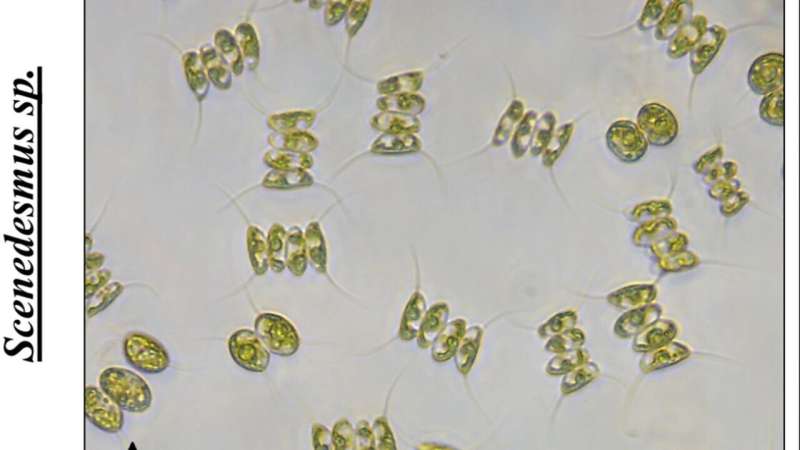Microalgae purify water and produce valuable compounds

Chemists at Umeå University within the MicroBioRefine consortium show that Nordic microalgae that are allowed to grow in salt water both purify this water efficiently and produce valuable compounds, so-called carotenoids. The research results are published in the journal Bioresource Technology.
Research within so-called blue bioeconomy is progressing rapidly on a global scale. Can algae with high biomass production and water treatment properties be the biomass producer, water purifier and sustainable fuel of the future? There is a great interest in the development of the use of aquatic photosynthetic sources—algae and cyanobacteria.
Within the MicroBioRefine consortium at Umeå University led by Professor Christiane Funk, the researchers are investigating the potential of Nordic microalgae for wastewater recycling and biomass generation. The algae purify wastewater from the polluting nutrients nitrogen and phosphorus that could otherwise lead to eutrophication of our waters.
"But not only that. We have also been able to show that the algae remove other dangerous pollutants such as pharmaceuticals and heavy metals. In fact, our algae can remove some of these compounds more efficiently than conventional wastewater treatment," says Christiane Funk, professor at the Department of Chemistry at Umeå University.
The wastewater fertilizes the algae, which in turn produce biomass. However, since the source is municipal wastewater, the use of the algal biomass is very limited.
"Because our algae are so effective at cleaning, their biomass contains lots of dangerous compounds. Microalgae biomass from wastewater cannot be used for food or feed," says Christiane Funk.
However, postdoctoral researcher Sanjeet Mehariya, doctoral student Martin Plöhn, and Spanish guest researcher Antonio Leon-Vaz—all members of Christiane Funk's research group—together with a researcher from Luleå University of Technology have found a solution to the problem. They have been able to demonstrate that some species of Nordic Desmodesmus-strains of microalgae can grow in saltwater. The presence of salt stresses the algae and therefore they produce large amounts of carotenoids. Carotenoids are high-value biomass products which are used in health care, food processing, pharmaceuticals and cosmetics.
"We can now grow these algae species in Baltic Sea waters. The algae manage to purify the problematic sea water and at the same time they produce valuable compounds."
More information: Sanjeet Mehariya et al, Improving the content of high value compounds in Nordic Desmodesmus microalgal strains, Bioresource Technology (2022). DOI: 10.1016/j.biortech.2022.127445
Journal information: Bioresource Technology
Provided by Umea University




















